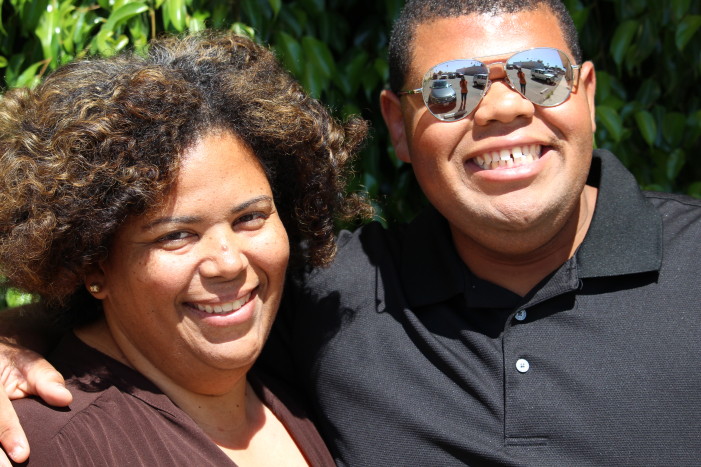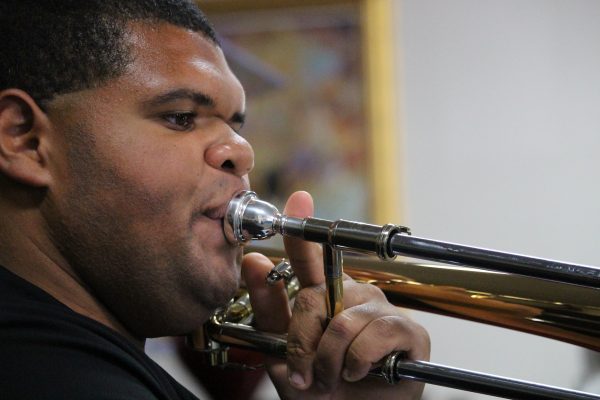
By Chida R. Warren-Darby – Managing Editor
For individuals living their lives with the absence of a disability, day to day functions can be taken for granted. Therese Davis, of San Diego, knows all too well the difficulties of living life day to day with family members who strive to live comfortably with a physical and developmental disability. When her 22 year old son, Terrence Patridge, was a child, he was diagnosed with autism. As he grew, she made adjustments to their lives to ensure his comfort and growth with this disability. In addition, her mother began to develop multiple physical conditions that made it hard for her to function, while living apart from her daughter and grandson. With two individuals in her life that she held dear, Davis grew anxious in finding a way to make things easier for she and her family – under one roof.
 One evening, she attended a presentation where she met Nathan Schmid, executive director of the Southern California Housing Collaborative, which is an organization designed to locate and secure affordable housing opportunities for low income individuals with developmental disabilities. His presentation of the organization and his role was music to Davis’ ears. “Nathan shared what [the organization] did, and his commitment to this effort.” She knew he was truly committed because he too had a child with a developmental disability. After his presentation, she was able to share with Schmid that she had a son that was autistic and would not be able to live on his own as an adult. In 2009, Schmid was given the opportunity to become executive director of the organization which is a non-profit vendor of the San Diego Regional Center. With the mission of locating and securing affordable housing opportunities for persons with developmental disabilities, he knew he had found a great organization to work for. “As the father of an 11 year old daughter who has cerebral palsy and uses a wheelchair, I know first-hand how having a child with a developmental disability can effect an entire family,” Schmid reflects. He took Davis’ concerns to heart, and they kept in touch. No immediate visible moves were made, but the contact was vital. After their connection, Schmid added Davis’ name to a list that he would keep near of individuals who resided with family members who had a developmental disability, and needed housing. For some time, Davis had been aggressively searching for an affordable property that her son could live in comfortably, as he transitioned into adulthood, and as she continued on as his caretaker. Space for her mother was a huge bonus.
One evening, she attended a presentation where she met Nathan Schmid, executive director of the Southern California Housing Collaborative, which is an organization designed to locate and secure affordable housing opportunities for low income individuals with developmental disabilities. His presentation of the organization and his role was music to Davis’ ears. “Nathan shared what [the organization] did, and his commitment to this effort.” She knew he was truly committed because he too had a child with a developmental disability. After his presentation, she was able to share with Schmid that she had a son that was autistic and would not be able to live on his own as an adult. In 2009, Schmid was given the opportunity to become executive director of the organization which is a non-profit vendor of the San Diego Regional Center. With the mission of locating and securing affordable housing opportunities for persons with developmental disabilities, he knew he had found a great organization to work for. “As the father of an 11 year old daughter who has cerebral palsy and uses a wheelchair, I know first-hand how having a child with a developmental disability can effect an entire family,” Schmid reflects. He took Davis’ concerns to heart, and they kept in touch. No immediate visible moves were made, but the contact was vital. After their connection, Schmid added Davis’ name to a list that he would keep near of individuals who resided with family members who had a developmental disability, and needed housing. For some time, Davis had been aggressively searching for an affordable property that her son could live in comfortably, as he transitioned into adulthood, and as she continued on as his caretaker. Space for her mother was a huge bonus.
“One day Nathan called me with information on a new facility that was opening up,” Davis recalls. Because her mother’s falls had begun to increase, Schmid’s call was timely. “There was an elevator in the building,” she shared, and more than enough space for the three of them. Needless to say, they moved in.
At their previous residence, Terrence didn’t have the wherewithal to practice his trombone the way he needed to. Her mother needed a space that was safe for her to live in, not hazardous. Now Terrence can play his trombone and even has room for a piano, and her 74 year old mother is very happy. “She loves her bathroom, which is in the master bedroom,” said Davis. “Everything is in close for her proximity.” It’s walker accessible and spacious enough for her to maneuver through the home comfortably. “The ability to have the room and a place we can afford where the three of us can live as a family under one roof in San Diego is a dream come true.” The amazing thing is that it is a home that accommodates two individuals with two different types of disabilities. “My son needed a place to decompress,” she shared. “His way of dealing with stress is through music.”
The use of space can play a significant role in an individual’s day to day activities, especially if that person is living life with a developmental disability, which is classified as a disability that originated before an individual attains the age of 18 years, continues, or can be expected to continue, indefinitely, and constitutes a substantial disability for that individual. In the case of Terrence, his use of more space, while living with autism, has given him an opportunity to flourish and explore life. Because of his interest in music and increased love for it, his journey has been documented by Drama House Productions in a film titled Bass Clef Bliss which will premiere on April 17th at the La Jolla Country Club. He is currently in a college to career program and is the first student to access the program’s music department. “Terrence is doing much better, and as time has gone on, he’s grown and defied expectations that doctors had for him years ago,” said Davis.
To date, SCHC has assisted nearly 150 developmentally disabled adults and families with developmentally disabled children with relocating to much improved housing. Recently the organization broke ground a property in the Southeastern San Diego community of Lincoln Park, a stone’s throw from Lincoln High School. The rents will range from $629 to $1250 depending on family size and income, and will also consist of a three bedroom floor plan. Select units will have wheelchair accessible roll-in showers. “Independence Point is truly a monumental achievement for our organization as 25 of the 32 total units will be set-aside for households that have at least one developmentally disabled member. These will be the first ever brand new affordable housing units ever built in the City and County of San Diego for this population,” said Schmid. “SCHC would like to thank our developer partner Chelsea Investment Corporation, the San Diego City Council and especially Councilmember Myrtle Cole, the San Diego Housing Commission, the San Diego Regional Center, the Foundation for Developmental Disabilities, the Corporation for Supportive Housing and the San Diego Housing Federation as all played an important role in turning our vision into a reality.” Davis is a strong believer that housing is a human right, not a luxury. “It shouldn’t be a challenge for people to find a safe place to live. I’m hoping that people find the value in this new property and its development, she said. “I’m sure this is why Nathan does what he does.”
For more information on the new development, Independence Point, contact the Southern California Housing Collaborative at (858) 514-7009 or visit www.socalhc.org to access the online application.


